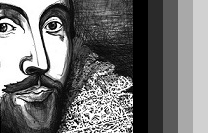Monday,11,2019
Published on May 29th, 2008 in The Telegraph India.

The Odeon Festival this year placed on its marquee Girish Karnad’s new work, eagerly awaited by all, and Rajat Kapoor’s latest production, not as hot a ticket because it sounded like a repeat of his earlier clown show. As things turned out, in an unusual reversal of expectations, Kapoor upstaged Karnad.
In Wedding Album, written originally in English, Karnad seems to have decided to compose a Mahesh Dattani play. He has never attempted realistic domestic drama before, preferring traditional or historical stories. Only for Broken Images did he move into contemporary material, about a famous author interviewed on television. Nor has he given so much elbow room for comedy in any previous play.
Therefore this marks a departure for him, but the direction he travels is not novel. The occasion of a marriage in a Saraswat Brahmin family in Dharwad, Karnataka, allows him to examine the community in a benevolently satirical manner and, under the guise of humour, underscore marriage as an imperfect institution. We view as many as six relationships in distress or malfunctioning communication, which strikes me as too schematically planned. The parents preparing for their younger daughter’s wedding hardly talk to each other, the father avoiding any confrontation. The elder daughter’s love marriage has possibly lost its spark. The son’s affair with a Christian girl ends abruptly, and he settles into a convenient arranged match. His would-be in-laws bicker. The younger daughter’s cyber marriage to an Indian American, who feels Indian women enshrine virtue and culture, is headed for disaster. Even the cook’s daughter was a kept woman before she went mad.
The first act engages us by revealing the interrelations gradually, Karnad employing his excellent sense of situation and conversation to great effect. One could see him drawing upon the autobiographical wellspring of his early life and society in Dharwad, which he has not done so far. Once that is over, however, the second half becomes a transparent exercise in tying up all the threads, some of which, we realize in hindsight, were quite unnecessary — like the concupiscent teenage boy and the unresolved question of the younger daughter’s parentage.
Lillete Dubey directs Prime Time Theatre as professionally as ever, with Utkarsh Mazumdar (the typically forgetful and irrelevant Indian father) stealing the show completely. The naturalistic acting of Smita Jaykar (the mother), Suchitra Pillai and Ira Dubey (the daughters) overshadows Rajev Paul (the son). Raaghav Chanana puts on American twang and mannerisms convincingly as the son-in-law. Yet we must conclude that Karnad has given us far superior drama in the past.
Cinematograph’s Hamlet the Clown Prince continues where C for Clown left off, at the same festival in 2006. But where its precursor used nonsense language, here Rajat Kapoor chooses to make his tatty troupe of faux European clowns intelligible in accented English as well as Shakespearean lines. It could have been much more challenging to enact Hamlet without comprehensible dialogue, but the team of six compensates by their effervescent, irreverent romp through the plot of the Prince of Denmark.
Again, the method is not new: as Shakespeare’s most famous tragedy, Hamlet has received riotously funny treatment from many directors because it lends itself so easily to parody, going back to the 1960s, in Charles Marowitz’s deconstructed Hamlet or Joseph Papp’s Naked Hamlet. Kapoor follows in these footsteps, upending many of the original scenes in truly carnivalesque style.
First, he inserts jokes appropriate to the venue. Atul Kumar (picture, in the lead with Ophelia) arrives late and blames it on confusion as to how a theatre can exist under a temple (Birla Sabhagar), for in Mumbai the two remain distinctly apart. He makes a particularly enjoyable Sad-Sack Hamlet, always a bit aloof from his goofy colleagues. Neel Bhopalam complements him with robust farce; in the Ghost’s part, he reveals the murder through ludicrous dumb charades, asking Hamlet to guess correctly, and because he himself loves dancing, does not lose the opportunity to show off some fancy steps.
Among other delicious sequences, when Hamlet accosts Gertrude in her chamber, the prompters speak so loudly and incessantly that the performers can only mouth the lines, upsetting Kumar so much that he runs a sword through one prompter, who turns out to be Polonius. Then he sits with Gertrude, contrasting her late husband and Claudius by pointing to members of the audience, identifying the usurper as a certain bespectacled and moustached theatre critic, much to everyone’s glee.
Like true clowns, though, Kapoor successfully brings out the pathos in Hamlet at the end. This elevates the pastiche from just a virtuosic display of improvization, and elicited a standing ovation.
